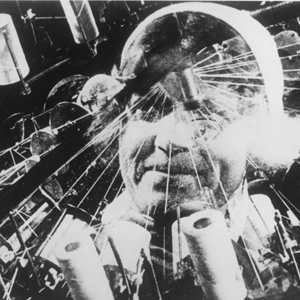
ACFNY SUPPORTED | FILM RETROSPECTIVE | DZIGA VERTOV | Heart of the World | Kino-Pravda nos. 18, 20–22
Heart of the World (2000, Canada)
Directed by Guy Maddin.
6 min.
Kino-Pravda nos. 18, 20–22 (1924-25, USSR)
Directed by Dziga Vertov
Silent. Approx. 90 min.
No. 18 is boastfully subtitled “A Movie Camera Race over 299 Metres and 14 Minutes and 50 Seconds in the Direction of Soviet Reality”—a key example of Vertov’s delirious attempt to defy constraints of space-time travel, to be everywhere at once, through “impossible,” visionary linkages of different geographic locations, moving West to East, from Paris to Moscow, with dramatic tracking shots and cameras positioned underneath descending airplanes, amid racing cars, on trams, all culminating in the momentous “Octobrization” of a baby at a worker’s collective (a Communist attempt to supplant the ritual of baptism). No. 20, “Pioneer Pravda,” is a follow-up to Kino-Eye, with Young Pioneer boys like “Little Smoked Sprat” and “The Gypsy Kid” communing with wolves, snakes, and elephants at a zoo, but the film is most remarkable for its stunningly edited railway journey sequence. No. 21 is a “Film Poem about Lenin,” commemorating the first anniversary of his death, and, in a Hegelian-Marxist dialectical triad of thesis-antithesis-synthesis, narrating his achievements (from his assassination attempt to the Red Terror policy to images of Soviet Russia’s progress under Bolshevism), his declining health and death (famously illustrated by Vertov and Rodchenko’s animated titling and their astonishing funeral sequence), and his triumphant legacy (cleverly represented by animated images of swelling crowds of workers morphing into newsreel shots of the Communist Party standing strong and proud). No. 22, the “Peasant Kino-Pravda,” was made as part of the smychka campaign to unite workers and peasants, and to demonstrate that “Lenin is Alive in the Heart of the Peasant” and in the hearts of oppressed Asians and Africans.
With piano accompaniment by Donald Sosin.
Introduction by Guy Maddin
ABOUT THE RETROSPECTIVE
Of all the masters of Soviet cinema—most notably Sergei Eisenstein, Lev Kuleshov, Vsevolod Pudovkin, and Grigori Aleksandrov—Dziga Vertov (né Denis Arkadievitch Kaufman, 1896–1954) is arguably the one whose still-radical experiments in image and sound, and enduring influence among an astonishing range of contemporary filmmakers and artists, from Jean-Luc Godard to Richard Serra to Steve McQueen, have yet to be fully appreciated or celebrated.
In close collaboration with the Austrian Cultural Forum New York and the Austrian Film Museum, MoMA has launched this retrospective, the most comprehensive ever assembled in the United States, and seeks to redress this with an extensive selection of Vertov’s silent films, sound features, and related work by collaborators and rivals in what Vertov called his “factory of facts.”
This screening is one of 11 programs of Vertov’s silent films, drawn primarily from the Austrian Film Museum’s unparalleled collection, including the premieres of fourteen Kino-Week films from 1918–19, and, for the first time together, all of his extant Kino-Pravda films from 1922–25. The retrospective continues with such masterworks as Stride, Soviet! (1926), A Sixth Part of the World (1926), The Eleventh Year (1928), Enthusiasm: Symphony of the Donbass (1930), Three Songs of Lenin (1935/38), and other sound films. Vertov’s exhilarating body of work must be seen not as a succession of individual films, but as one continuously evolving movie; “free of the limits of time and space,” he wrote, it would lead to “a fresh perception of the world” and a revolutionary passage from the Old to the New.
All films directed by Vertov, except where noted, and with simultaneous English translation or electronic subtitles. Screening descriptions adapted from texts by Yuri Tsivian and others, principally from the 23rd Pordenone Silent Film Festival catalogue.
VENUE
The Museum of Modern Art
Theater 2 (The Roy and Niuta Titus Theater 2), T2
11 West 53 Street
New York, NY 10019
www.moma.org
Film admission tickets can be purchased in person only. Museum members may reserve screening tickets online.
Please visit http://www.moma.org/visit/calendar/film_screenings/12166

